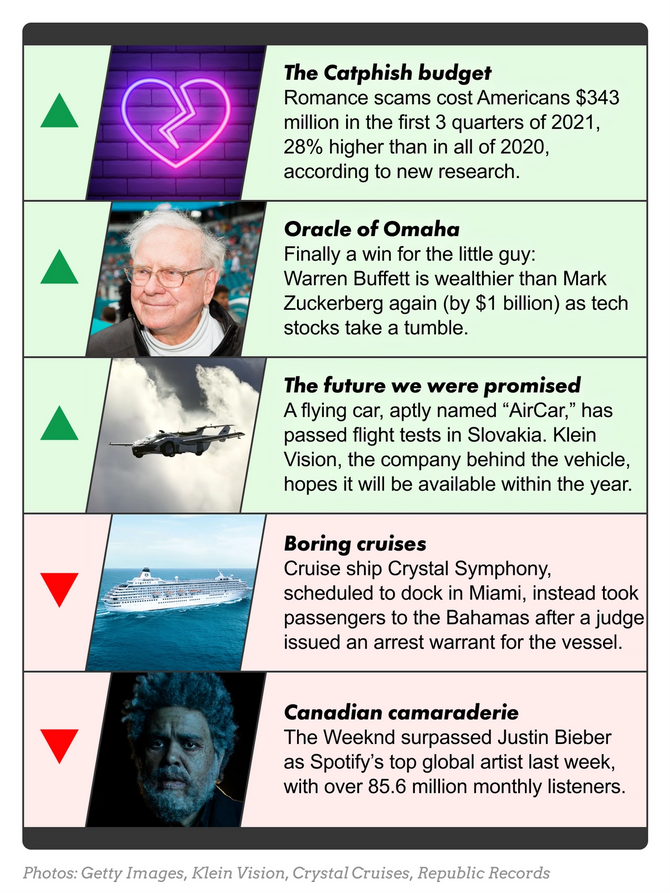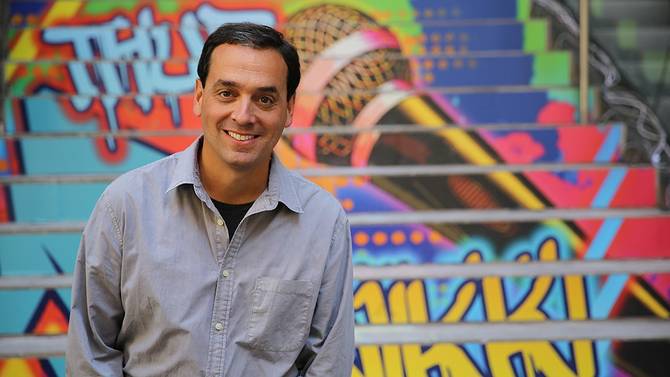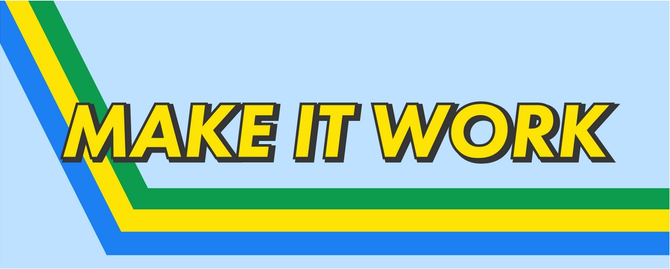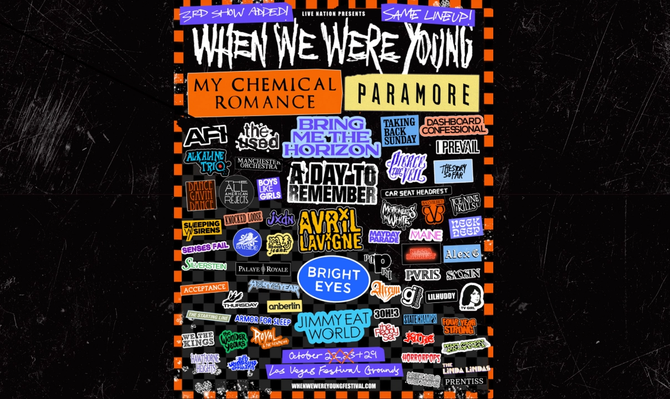| | | | | |  Jiaqi Wang | | IN THIS ISSUE | Why regret is so powerful | The pop-punk festival the internet couldn't believe | An LA mansion with a spooky past | | | | Good morning from slushy Manhattan. As I was listening to a podcast this week, I stumbled upon a unique approach to making decisions: flip a coin. You're probably thinking, that's not unique! Two-Face has been doing that since 1942. He flips a coin and then acts based on the outcome of the toss. But I'm not suggesting you take your philosophical cues from a comic book villain. There's a second approach that's far more fun, and certainly more effective: You flip a coin and, while the coin is in the air, observe which outcome you're rooting for. In that way you can discover the option you really want for yourself. I'll turn it over to Danish polymath Piet Hein, who wrote this lovely poem on the subject: Whenever you're called on to make up your mind,
and you're hampered by not having any,
the best way to solve the dilemma, you'll find,
is simply by spinning a penny.
No—not so that chance shall decide the affair
while you're passively standing there moping;
but the moment the penny is up in the air,
you suddenly know what you're hoping. —Neal Freyman | | | | | | | | | Daniel Pink From failing to ask our crush out to drinking a little too much at a wedding, we've all experienced some form of regret. According to Daniel Pink's new book, The Power of Regret, that's actually a good thing: Regret can help us become better people by revealing the things we want most out of life. To help inform his argument, Pink developed a regret framework after collecting regrets from 16,000 people all over the world in the World Regret Survey. We talked to Pink about this misunderstood emotion and didn't regret it! The most iconic depiction of regret is the person on their deathbed lamenting, "Oh, I wish I had done all these things…" Why didn't you discuss this in your book? Those end-of-life regrets are very interesting—what I wanted to suggest is that everybody has regrets at different stages of their lives and I'm not sure that those end-of-life regrets are more valuable than the regret of the 16,000 people who submitted regrets from age 16 to age 90. I think the danger is to think that the only people with regrets are people who are seeing the darkness come in and seeing the end of their life. I don't think that's right because I think regret is a much more universal emotion, a much more common experience for people of all ages. In the book you write about the power of self-compassion. What about it speaks to you? I'd always been skeptical of self-esteem and knew some of that research. And self-esteem isn't all bad, right? But self-esteem divorced from real achievement isn't all that great for us, especially for kids. What surprised me was looking at the research for the effectiveness of self-criticism and realizing there's not much evidence that it's any good. And then seeing this third way, and looking at Kristin Neff's research, I said, holy smokes—this is actually a powerful concept, and it also makes intuitive sense. For instance, when I exercise or run, until I read this research I would always lacerate myself if I was going too slow or not going far enough, and thinking that that's really motivation. And it isn't! Now, it's not saying, "You're running really slowly but you're still an awesome person, Dan, you're just so great." That doesn't work either. What works is saying, "OK, you're running right now. Running is really hard. You're maybe having a little bit of an off day, but you're not the only person who's had an off day, but focus on the fundamentals and keep moving." Jeff Bezos famously uses a "Regret Minimization Framework," in which he projects himself at age 80 and tries to limit the number of regrets he has in life. If we scored a chat for you and Jeff, what advice would you give him about his strategy? I would say, "You're on the right track, Jeff! But you can't minimize all your regrets, so minimize the ones that are most important." And 16,000 people have told us what are the most important regrets to minimize: 1) regrets about stability 2) regrets about boldness 3) regrets about morality and 4) regrets about connection. But I don't want people to try to minimize every single regret because they'll go nuts. It's foundational in social psychology that maximizers tend to be miserable. Should I have a vodka martini cocktail tonight or an Old-Fashioned? Which will I regret more? Should I have macaroni and cheese for dinner or a hamburger? Which will I regret more? Should I wear my green sweater or my red—you'll go crazy! And so I don't want people to minimize every regret, what I want them to do is focus on these four core regrets and optimize those. If you could have one person endorse your book on the front cover, who would it be? I'm just going to be completely mercenary and go for whoever has the biggest following, and so I'm going with the pope. This interview has been edited and condensed for clarity.
| | | | | | When you picture yourself doing your taxes, you probably don't imagine a gentle breeze at your back, sand between your toes, and a smile on your face. But there is indeed a reason to be cheesin' this tax szn—and it all comes courtesy of TaxAct. With TaxAct Xpert Assist, you can file your taxes online and get free advice from CPAs and other tax experts in real time for all returns. It's the unlimited guidance you need, when you need it. Feelin' the breeze yet? Just wait: TaxAct also gives you free access to prior returns, top-of-the-line security when filing, and your maximum refund is guaranteed. They're so sure their numbers are correct, TaxAct backs up every return with their $100k Accuracy Guarantee. Your best, breeziest tax season awaits. Get started here. | | | | Each week, our workplace whisperer Shane Loughnane answers a reader-submitted question about work in 2022. Anything bothering you at work? Ask Shane here. My supervisor consistently remarks that they "wouldn't know what to do without me"; told their partner, "I'd be more upset if [me] left than if you [partner] left me"; and, "I might have an emotional breakdown if you leave…never leave me." How do I handle these, especially given this supervisor has a major role in HR?—M. This sounds anywhere from a bit inappropriate to pretty darn spooky, but a lot of that depends on context and verbal cues that I'm unable to parse from my position. From a workplace perspective, it's unhealthy and toxic communication—especially from a manager and especially from someone with a role in HR. You should never be put in a position where you feel like you have to manage your supervisor's emotions or that you're being guilt-tripped into staying on. You'll need to find a way to set some boundaries and change the dynamic of this relationship. One approach I would try is to let your supervisor know that you don't feel like the feedback you're getting from them is always the most professional or useful to your continued growth. I'd recommend citing some of these examples in writing so that you are protected with a paper trail if this were to happen again or escalate from here (at which point, you would want to bring in your supervisor's manager or someone else in HR). Hopefully this will be enough to encourage your boss to reassess both how they evaluate you as a contributor and how they interact with you as an employee. Regardless of how that plays out, you may want to consider looking for other opportunities that would allow you the chance to work with a different supervisor. While it's nice to have a manager who values and appreciates your work, it's just as important that they possess the emotional IQ to be an effective leader and an appropriate mentor. You deserve to work with someone who can do both. | | | When We Were Young Festival For a brief moment on January 18, everyone who spent their teen years begging their parents for a lip ring felt pure joy: The When We Were Young festival was announced and emo/pop-punk fans around the country whipped out their credit cards. Festival details: The lineup includes a staggering 60+ acts, including every band you used to listen to exclusively on a blue iPod nano—My Chemical Romance, Paramore, and Taking Back Sunday. The festival will take place in Las Vegas and was initially scheduled for one wild day on October 22. But after selling out, it was extended to three days with almost all the bands playing each day. Hold on a sec Millennials, who were raised on fear-mongering chain emails and watched both Fyre Fest documentaries, said, "Wait, is the When We Were Young festival a scam?" They called out a few red flags. Logistics: The official schedule won't be released until closer to the festival, but a viral TikTok calculated the math of having every band play every day and…it doesn't add up. - Some critics called the setup dangerous and pointed out that Live Nation, the entertainment juggernaut that's organizing the event, also produced the Astroworld Festival, Travis Scott's festival in Houston this past November where 10 people were killed as the result of a crowd surge.
- Live Nation denied claims that the festival was thrown together like a last-minute gift for your cousin. The company said a lot of planning has gone into the festival, and that it would work with Las Vegas officials to keep fans safe.
Customer service: Cristina Amaya, vice chair for the International Game Developers Association, documented her experience trying to cancel a waitlist ticket within the allotted 24-hour window and claimed she was directed to a customer service number that doesn't exist, had to endure wild email exchanges with alleged scammers who did not work for the company, and was given no clear answers from Live Nation as to why she had this experience. Price: Current tickets for the third day, the only one that's not sold out, start at $245 for general admission but jump to $420 for general admission+, which appears to be general admission with access to a "dedicated entry lane" to the festival and air-conditioned restrooms. There's also a $519 VIP package that includes special viewing areas and charging stations, and a $12,500 VIP cabana. - Definitely steep for a show, but…have you been to a Live Nation festival? Tickets for Lollapalooza (the Live Nation fest in Chicago) run anywhere from $130 for one-day general admission to $4,200 for the four-day platinum package.
Despite these concerns, the festival seems like a go. Live Nation has said in a statement that it knew people would doubt the extremely stacked lineup, but said the festival is 100% real and 100% going to happen. Big picture: The frenzy around the When We Were Young fest highlights the renaissance of pop-punk, a genre that's been revived by pandemic-weary millennials curled up at home with the angsty music of their childhood. But it's not just '90s kids reveling in this misery business—new artists like Olivia Rodrigo, Machine Gun Kelly, and Meet Me at the Altar have breathed new life into pop-punk, as have emerging K-pop acts and mashup geniuses on TikTok.—MM | | | | | | Socks that won't slow you down. With Bombas performance socks, you can work out as hard as you want knowing you made a smart decision for your feet. These comfy socks are designed to be supportive, non-bulky, moisture-wicking, and totally rad. Stay fit and comfy with performance socks from Bombas. | | | | Welcome to Open House, the only newsletter section that name drops more than your LA friends. We'll give you a few facts about a listing and you try to guess the price.  The Altman Brothers Team The Altman Brothers TeamToday we're heading to Beverly Hills and, more specifically, the highly exclusive neighborhood of Benedict Canyon. The current owner of this 21,000 square-foot compound is producer Jeff Franklin, creator of Full House. This mansion also sits on the lot previously occupied by the house where Manson cult members murdered actress Sharon Tate and three others. So umm…there's a lot of history. Amenities include: - 9 beds, 18 baths
- Stone motor court (aka a driveway, but rich)
- Lazy river for all the neighborhood kids
- Your own private hair salon, stylist not included
How much to tell people, "Yeah, something gruesome happened on my grounds"? | | | 1. Nothing sacred: These apps reserve the right to sell your prayers. (BuzzFeed News) 2. She was a notorious hacker in the '80s—then she disappeared. (The Verge) 3. There is no CD revival, unless maybe you are Adele. (Dada Drummer Almanach) 4. The cult of Casey's: How gas stations became essential to American culture. (Men Yell at Me) 5. Barbados and the end of monarchy. (History Today) 6. Robinhood, early access to IPOs, and the "democratization of finance." (Margins) 7. Why is Silicon Valley still waiting for the next big thing? (New York Times) 8. The revenge of the hot water bottle. (Low-tech Magazine) 9. The finely pressed, death-defying world of extreme ironing. (Mel Magazine) 10. Fixer upper: The right to repair could soon be a reality. (Morning Brew) Persistent brain fog? Bloating? Chronic exhaustion? Your options: a) Call your doc, b) Ask the internet, or c) Try Base, which uses at-home lab testing to identify the root cause of your health concerns and creates a customized improvement plan. Use code morningbrew for 20% off.* *This is sponsored advertising content | | | Welcome back to Morning Brew's Meme Battle, where we crown a single memelord every Sunday. Today's winner: Cal K. in San Francisco  This week's challenge: You can find the new template here for next Sunday. Once you're done making your meme, submit it at this link for consideration.
| | | | |  | Written by Neal Freyman, Matty Merritt, Max Knoblauch, Jamie Wilde, and Shane Loughnane Was this email forwarded to you? Sign up here WANT MORE BREW? Industry news, with a sense of humor → - Emerging Tech Brew: AI, crypto, space, autonomous vehicles, and more
- HR Brew: analysis of the employee-employer relationship
- Marketing Brew: the buzziest happenings in marketing and advertising
- Retail Brew: retail trends from DTC to "buy now, pay later"
Tips for smarter living → - Money Scoop: your personal finance upgrade
- Sidekick: lifestyle recs from every corner of the internet
| ADVERTISE // CAREERS // SHOP // FAQ
Update your email preferences or unsubscribe here.
View our privacy policy here.
Copyright © 2022 Morning Brew. All rights reserved.
22 W 19th St, 8th Floor, New York, NY 10011 | | |















No comments:
Post a Comment